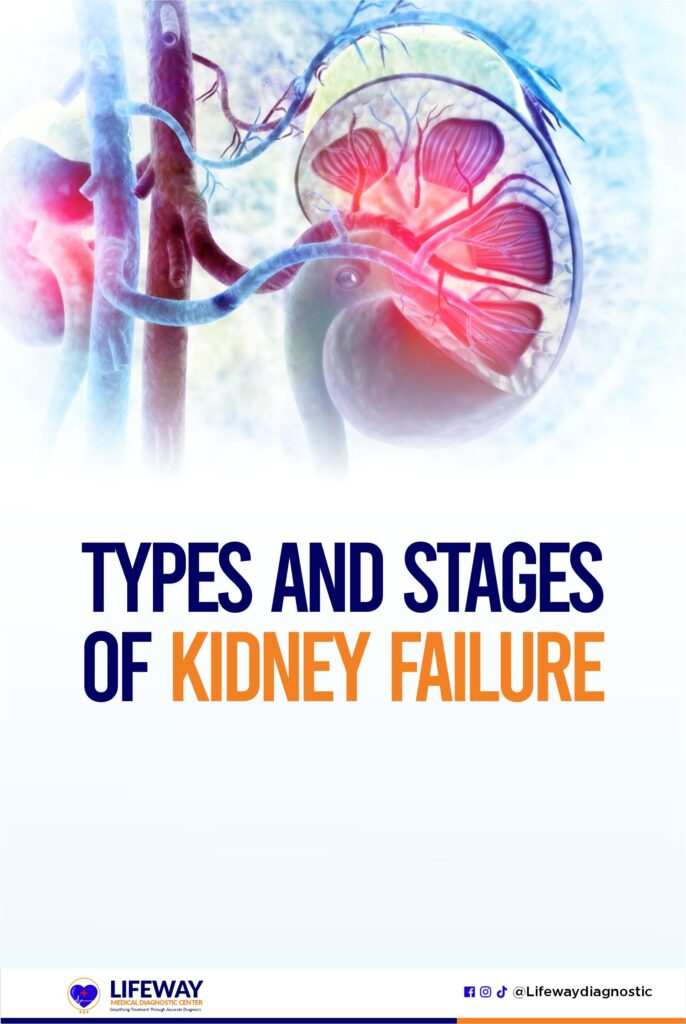Kidney failure, also known as renal failure, occurs when the kidneys can no longer perform their vital functions of filtering waste products and excess fluids from the blood.

This condition can be classified into different types and stages based on the underlying causes, symptoms, and level of kidney function.
Understanding the types and stages of kidney failure is crucial for proper diagnosis, treatment, and management of the condition.
In this article, we will explore the various types and stages of kidney failure in detail.
What is Kidney Failure?
Kidneys play a vital role in eliminating toxins, regulating electrolyte balance, and controlling blood pressure. These toxins go to your bladder and are excreted when you urinate.
Kidney failure occurs when the kidneys lose their ability to filter waste and fluid properly.
Regular check-ups, monitoring of kidney function, and maintaining a healthy lifestyle can help reduce the risk of developing kidney failure or slow its progression.
Types of Kidney Failure
1. Acute Kidney Injury (AKI):
Acute kidney injury refers to a sudden and temporary loss of kidney function. It is often caused by a sudden decrease in blood flow to the kidneys, kidney damage due to infections, medication toxicity, or other factors.
AKI can occur rapidly, within hours or days, and is typically reversible with prompt medical intervention.
2. Chronic Kidney Disease (CKD)
Chronic kidney disease results in gradual loss of kidney function. Underlying conditions like high blood pressure, diabetes, autoimmune disorders, kidney infections, genetic disorders, and excessive intake of herbs contribute to it.
CKD is categorized into five stages based on eGFR, measuring kidney filtering capacity.
3. End-Stage Renal Disease (ESRD):
End-stage renal disease is the final and severe stage of kidney failure, where kidney function is significantly impaired, leading to various symptoms and complications.
Stages of Chronic Kidney Disease (CKD)
There are five stages of Chronic Kidney Disease which include:
Stage 1:
In this stage, the eGFR is normal or slightly higher than normal (>90 mL/min). However, there may be signs of kidney damage, such as the presence of protein or blood in the urine.
This stage is possible to manage by avoiding tobacco products, managing your blood sugar, eating a balanced diet, and watching your weight.
Stage 2:
The estimated glomerular filtration rate is mildly reduced (60-89 mL/min), indicating mild kidney damage. Symptoms may still be absent or minimal at this stage, but protein can be detected.
Stage 3:
The eGFR (estimated glomerular filtration rate) moderately reduces (30-59 mL/min), indicating moderate kidney damage.
Symptoms such as swelling hands and feet, changes to urination frequency, and back pain may start becoming more noticeable, and complications of chronic kidney failure, such as anemia and bone disease, may develop.
Stage 4:
The estimated glomerular filtration rate severely reduces (15-29 mL/min), indicating severe kidney damage. Significant symptoms and complications, such as fluid retention, anemia, high blood pressure, bone diseases, and electrolyte imbalances, may be present.
Stage 5:
End-stage renal disease (ESRD) or kidney failure occurs when the eGFR is less than 15 mL/min or the need for kidney replacement therapy arises. Treatment options include dialysis or kidney transplantation to sustain the patient’s life.
It’s important to note that if the underlying cause of acute kidney injury (AKI) is not effectively treated or managed, it can progress to chronic kidney disease (CKD).
Furthermore, individuals with CKD are at a higher risk of developing AKI if they experience additional kidney insults, such as infections or certain medications.
Symptoms of Kidney Failure
The symptoms and complications of kidney failure can vary depending on the type and stage of the condition. However, common signs and complications may include:
- Fatigue and weakness
- Uraemia (high level of urea and creatinine)
- Swelling (edema) in the legs, ankles, or face
- Unexplained shortness of breath
- Decreased urine output or changes in urine color
- High blood pressure
- Fluid retention
- Back pain
- Difficulty concentrating and mental fog
- Cloudy or foamy urine
- Nausea and vomiting
- Pain or burning while urinating
- Muscle cramps and restless legs syndrome
- Itching and dry skin
- Poor sleep
- Loss of appetite and weight changes
Diagnosis of Kidney Failure
Diagnosing kidney failure involves a combination of medical history assessment, physical examination, and various diagnostic tests. Here’s an overview of the diagnostic process:
1. Physical Examination:
Your healthcare provider will begin by discussing your symptoms, medical history, and any risk factors you may have for kidney disease. They will ask questions about your overall health, the medications you are taking, and any family history of kidney problems.
A physical examination may be conducted to check for signs of kidney disease or related conditions. Your healthcare provider may examine your abdomen for swelling or tenderness, check your blood pressure, and assess other relevant indicators of kidney function.
2. Blood Tests:
Blood tests are essential in diagnosing kidney failure. These tests measure the levels of waste products, electrolytes, and other substances in your blood. The key blood tests for kidney function evaluation include:
Firstly, the serum creatinine test is conducted to measure levels of creatinine, and elevated levels of creatinine indicate decreased kidney function.
Secondly, the blood urea nitrogen (BUN) test is performed to evaluate levels of BUN, and increased BUN levels may point to impaired kidney function.
Lastly, the glomerular filtration rate (GFR) calculation is used to estimate how effectively the kidneys are filtering waste products from the blood.
3. Urine Tests:
Urine tests help evaluate kidney function and detect the presence of abnormalities. Healthcare providers commonly perform the following tests:
- Urinalysis: This examines a urine sample for the presence of blood, protein, or other abnormalities.
- Urine albumin test: Elevated levels of albumin may indicate kidney damage.
4. Imaging Tests:
Imaging tests provide visual information about the kidneys and help identify any structural abnormalities or blockages. Common imaging tests include:
- Ultrasound: This non-invasive test uses sound waves to produce images of the kidneys.
- CT scan or MRI: These imaging techniques offer more detailed views of the kidneys and surrounding structures.
5. Biopsy:
In certain cases, doctors may perform a kidney biopsy to obtain a small sample of kidney tissue for further examination. This procedure plays a crucial role in determining the underlying cause of kidney disease when other tests are inconclusive.
Complications of Kidney Failure
Kidney failure, also known as end-stage renal disease (ESRD), can lead to various complications that affect different systems of the body. Here are some common complications associated with kidney failure:
a) Fluid and electrolyte imbalances:
Kidneys play a crucial role in maintaining the balance of fluids and electrolytes in the body. Compromised kidney function can lead to imbalances, causing conditions such as edema (swelling), high blood pressure, and abnormal levels of sodium, potassium, and calcium in the blood.
b) Cardiovascular problems
Kidney failure increases the risk of cardiovascular diseases, including heart attacks, heart failure, and strokes. The imbalances in fluid volume, electrolytes, and the accumulation of waste products can strain the cardiovascular system.
c) Anemia
The kidneys produce erythropoietin, a hormone that stimulates the production of red blood cells. In kidney failure, erythropoietin production decreases, resulting in anemia, which can cause fatigue, weakness, and shortness of breath.
d) Bone and mineral disorders
The kidneys play a vital role in maintaining the balance of minerals such as calcium and phosphorus in the body. In kidney failure, these mineral imbalances can lead to bone weakening, osteoporosis, and an increased risk of fractures.
e)Metabolic acidosis
When the kidneys fail, they are unable to excrete acids from the body effectively. This can result in metabolic acidosis, a condition characterized by an accumulation of acid in the blood, leading to symptoms such as confusion, rapid breathing, and abnormal heart rhythms.
f) Malnutrition and weight loss
Kidney failure can cause a loss of appetite, nausea, and vomiting, leading to malnutrition and unintentional weight loss. The buildup of waste products can also contribute to a decreased desire to eat.
g) Nervous system complications
Kidney failure can affect the central and peripheral nervous systems, leading to symptoms such as difficulty concentrating, memory problems, numbness or tingling in the extremities, and even seizures in severe cases.
h) Weakened immune system
Kidney failure impairs the immune system, making individuals more susceptible to infections. Urinary tract infections, pneumonia, and skin infections are common in people with kidney failure.
i) Fluid overload and pulmonary edema
In advanced stages of kidney failure, excessive fluid accumulation can occur, leading to fluid overload and pulmonary edema, a condition where fluid enters the lungs and impairs breathing.
Conclusion:
Kidney failure can significantly impact an individual’s health and quality of life. Understanding kidney failure is crucial for early detection, treatment, and management.
Diagnosing kidney failure involves evaluating multiple factors.
Treatment options such as dialysis or kidney transplantation can help alleviate symptoms, control complications, and improve quality of life.
Contact Lifeway Medical Diagnostic Center to schedule your appointment for an accurate diagnosis and dialysis, if you are experiencing symptoms.
